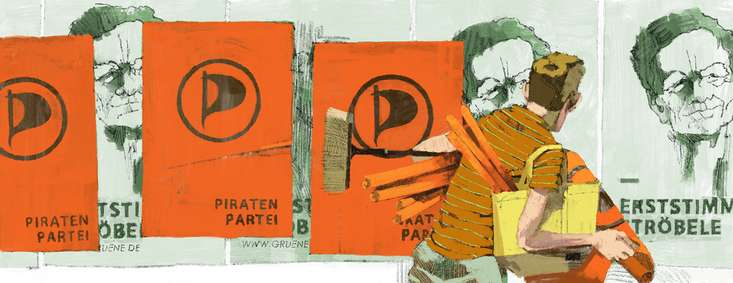Europe / Global
Europe
Briefing
The view from Germany's campaign trail, why crossing the Russia/Baltics border just got easier and an interview with a key figure in the Turkish protests.
Anyone for French tennis?
France
Nice hosts the seventh annual Francophone Games in September. Athletes and artists from all corners of the French-speaking world will compete in both sporting and cultural events, including poetry.
View from the campaign trail
From major to minor
By Markus Albers
Sebastian von Hoff is in the middle of a Kreuzberg street festival, between stalls selling caipirinhas and couscous. The Pirate Party’s local candidate in September’s federal election is handing out brochures and trying to talk to residents about data retention. “Usually we bring table football, which makes it easier to attract passers-by,” he says.
Next to von Hoff’s orange-coloured posters, Die Partei, a satirical fake party, is campaigning with the slogan “Inhalte überwinden” (To overcome content). A few blocks down the road, the Greens and the Left party have set up shop. The only ones missing are the former dominant parties: Social Democrats, Christian Democrats and Liberals. In this nonconformist multicultural neighbourhood a potentially radical aspect of Germany’s upcoming federal election is on display: the public and the media seem to find the small contenders more interesting than the traditional players.
Of course von Hoff, a 30-year-old chimney sweep by trade, doesn’t stand a chance of winning. He’ll be more than happy to just hurt local strongman Christian Ströbele of the Greens: “In the last federal election he got 48 per cent – we’d like to steal 15 per cent,” he says. Germany’s electoral system of proportional representation has always encouraged smaller parties but rarely have so many insurgents threatened to make an impact. Some 38 parties will take part in the election, though most will fail to gain the 5 per cent of votes needed to send delegates into parliament.
Still, the smaller parties are becoming increasingly important, says political scientist Oskar Niedermayer. Not least because they might take valuable support from the two opposing coalitions that are most likely to emerge after the poll: the centre-right coalition of Angela Merkel’s Christian Democrats and the Liberals, and the alliance between the Social Democrats and the Greens. The latest newcomer, Alternative für Deutschland (afp), a Eurosceptic party, is also close to the threshold. It seems to draw support mainly from cdu and fdp voters. “It is becoming increasingly difficult to predict election outcomes,” says Niedermayer. “It may depend on 1 or 2 per cent, with small parties such as the afp making the difference.”


Von Hoff doesn’t consider fragmentation a problem: he would rather see no coalition gain a majority. His “dream outcome” would be a minority government that has to form fleeting alliances with different opposition parties depending on certain subjects. “Does a stable majority produce better politics than ad hoc coalitions along topical lines?”
But, Niedermayer notes, the probability of von Hoff’s scenario is minimal. Germany’s proportional representation may not always produce clear majorities but, he says, “Germany always has the grand coalition as a last resort, so we will never be ungovernable.”
The three election outcome scenarios:
- Angela Merkel’s CDU/CSU perform strongly and its current coalition partner, the Liberals, win more than 5 per cent: Merkel remains chancellor at the head of the centre-right coalition.
- The SPD surges, Greens support remains at 15 per cent, the Liberals fail to reach 5 per cent: Peer Steinbrück becomes chancellor as head of a red/green coalition.
- Neither the centre-left or centre-right coalitions win enough votes or seats: Merkel and Steinbrück kiss and make up, forming a grand coalition with Merkel as chancellor.
On the verge
Estonia [BORDER CROSSING]
Crossing the border into Russia is notoriously challenging, particularly for vehicles leaving Finland or the Baltics. The queues can be tens of kilometres long, leaving trucks and drivers stuck for days.
Tech-savvy Estonians believe they have a solution. The GoSwift online border-queue system lets drivers register their border crossing in advance; drivers who arrive at the allotted time will get through within an hour.
Officials from several countries have studied the system and Lithuania will introduce it at its border to Kaliningrad this summer. “Our target is to be at every border station between the EU and Russia, Belarus and Ukraine,” says GoSwift CEO Hannes Plinte.
Q&A
Tayfun Kahraman
Protestor
Turkey
One of the key figures in the protests against plans to redevelop Istanbul’s Taksim Square and Gezi Park was 31-year-old Tayfun Kahraman, a member of Taksim Solidarity activist group. Kahraman, a civil servant, has since been transferred from Istanbul to Gaziantep in south Turkey.
How has the conversation about urban planning and democracy changed in Turkey since protests began?
The public has shown itself ready to take ownership of their city. People have said that they won’t accept that a government fait accompli is legitimate policy.
Why are you in Gaziantep?
Apart from my other duties, I’m a civil servant. My employer found it convenient to send me away from Istanbul for a while.
What are your expectations for the local elections scheduled for March next year?
Whether a new energy is being born is hard to say. But I can say that nothing in Turkey with regard to democracy and policy will be as it was.


